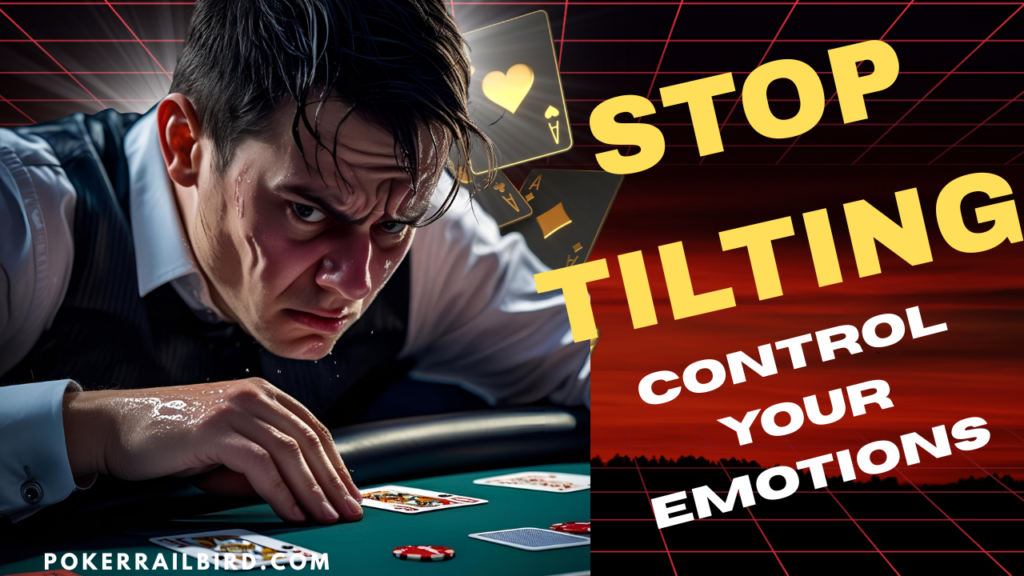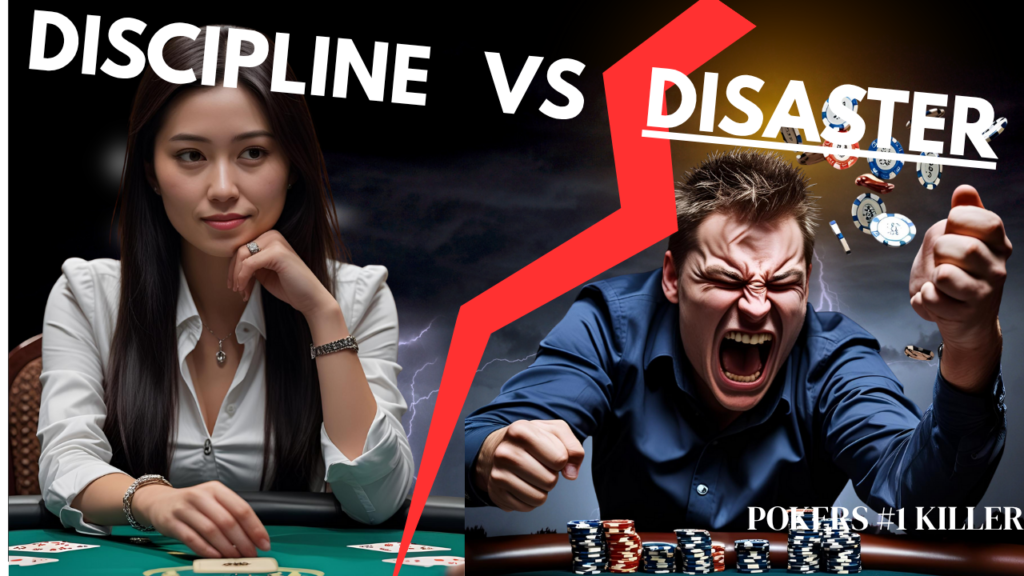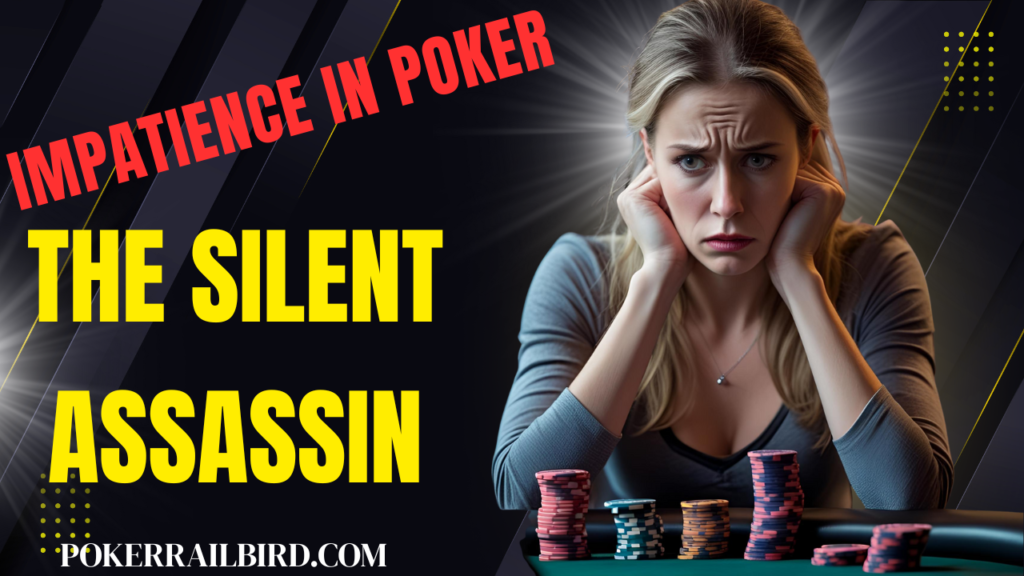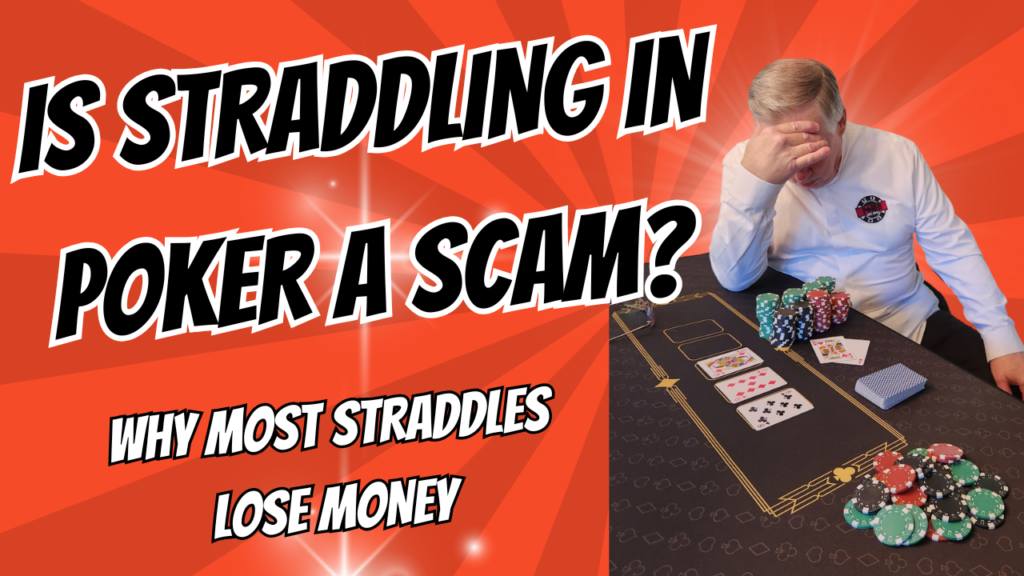DEADLY SIN NO. 9 - ACHING TO GET EVEN
WHY CHASING LOSSES DESTROYS POKER PLAYERS
“The dumbest words in poker are, ‘I’ve got to get even.’”
Getting even in poker is one of the most dangerous emotional traps a player can fall into. The moment those words cross your mind, you’ve already shifted from logic to emotion — from discipline to desperation. It’s not just about losing money; it’s about losing control. Every poker player, at some point, feels that burning urge to make things right — to fix a bad session, to punish the deck, or to reclaim dignity from a rough beat. But the truth is brutal: the harder you chase, the faster you sink.
What starts as a rational game of decisions quickly becomes a personal battle against your own frustration. You stop playing the cards, and start playing the pain.
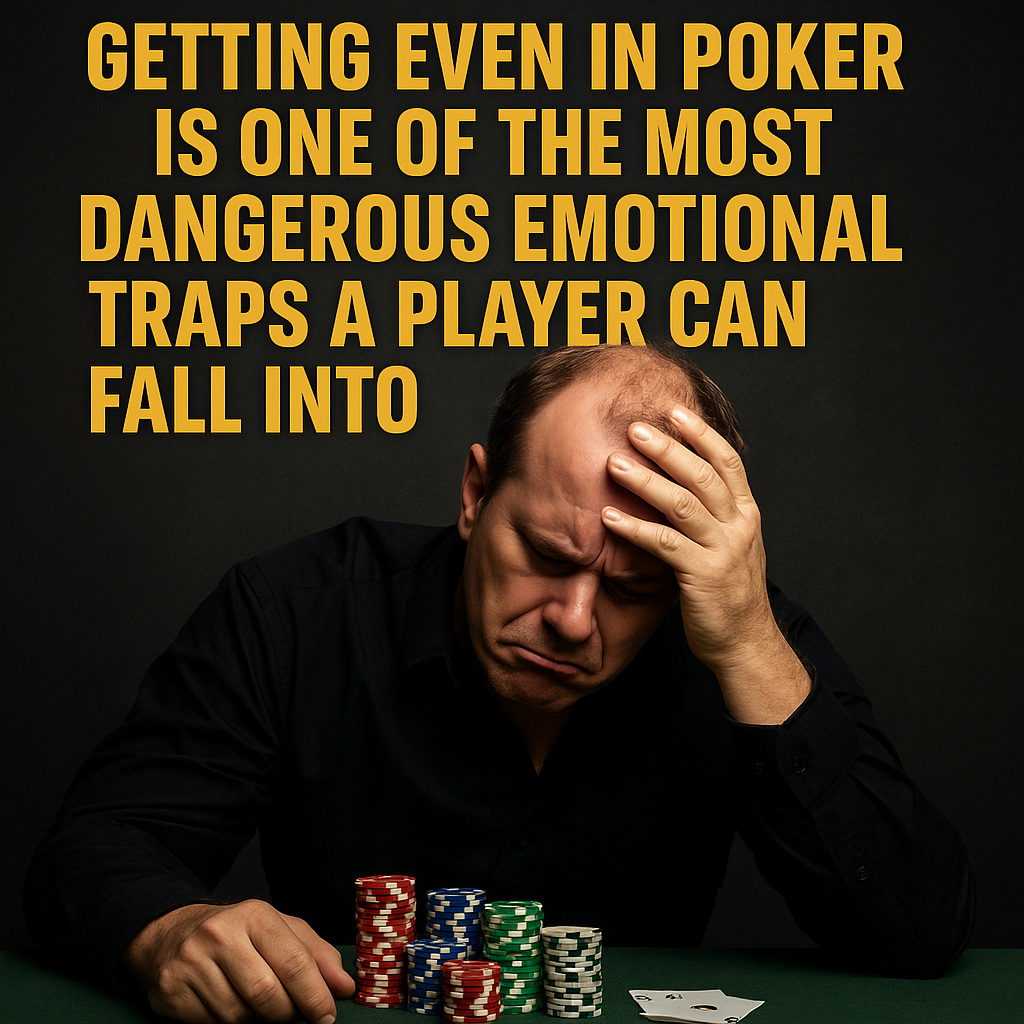
THE ILLUSION OF 'EVEN' - A DANGEROUS EMOTIONAL ANCHOR
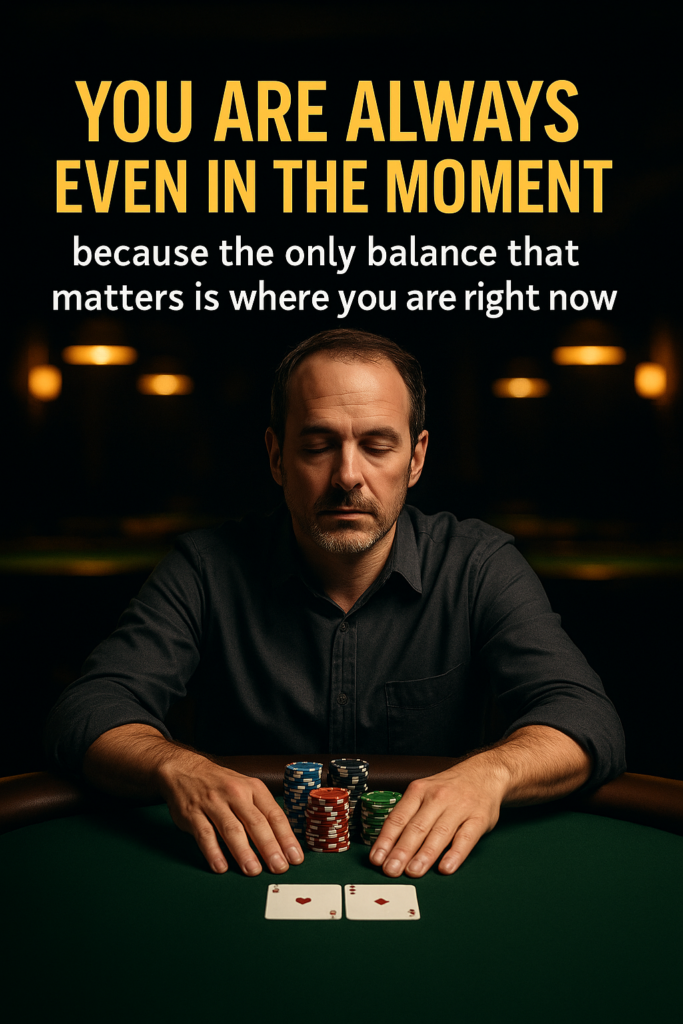
The idea of “getting even” sounds rational — but in poker, there is no even. It’s a mental mirage. When you lose $100 and later win $100, it feels like you’ve broken even, but you haven’t. You’ve only balanced an emotional ledger, not a mathematical one. In truth, you would have been $100 ahead had you not lost it in the first place. “Even” exists only in your mind, not in reality.
Poker doesn’t track fairness. It doesn’t remember your bad beats, your bad luck, or your frustration. Every chip you lose is gone — and every chip you have left is your new baseline. You are always even in the moment, because the only balance that matters is where you are right now.
When players cling to the illusion of “even,” they stop thinking about probability and start thinking about payback. They compare their current stack to a fantasy version of where they “should” be — and that comparison fuels frustration. You can’t make good decisions when your target is imaginary.
Once you let go of the illusion of “even,” you start playing poker again. You stop chasing the ghost of what was, and begin making decisions based on what is. But once you believe the illusion, the real damage begins.
THE DOWNWARD SPIRAL - HOW "GETTING EVEN" TURNS SMART PLAYERS STUPID
It always starts the same way.
You lose a few pots.
Frustration builds.
You loosen up to force results.
And before you know it, you’re chasing ghosts with hands you’d normally throw away.
It’s a pattern every experienced player has lived through. You take a bad beat, shake your head, and a few hands later you find yourself 3-betting junk — trying to “win it back.” You tell yourself it’s just aggression or image-building, but it’s not. It’s emotion disguised as strategy.
At that moment, getting even in poker becomes the new goal — and that’s where everything unravels. You’re not playing to win anymore; you’re playing to erase. The logic that guided your earlier decisions shuts down, replaced by a silent promise to the ego: I’ll make this right. But poker doesn’t honor emotional contracts. It only honors correct decisions, and when desperation takes over, those decisions crumble fast.
The psychology of this spiral is simple but devastating. When ego takes the wheel, logic gets locked in the trunk. You start rationalizing bad calls, forcing bluffs, and convincing yourself that one big pot will fix everything. But it never does — because you’re not chasing chips anymore; you’re chasing redemption.
🎯 “When you’re trying to get even, you’re no longer trying to win — you’re trying to rewrite the past.”
SIDEBAR: THE PSYCHOLOGY OF SELF-INFLICTED TILT
Tilt isn’t always triggered by bad beats or brutal luck. Sometimes, we create it ourselves. The urge to start getting even in poker is a textbook example of self-inflicted tilt — an emotional reaction masquerading as strategy. Here’s what drives it:
.
LOSS AVERSON
EGO DEFENSE
ILLUSION OF CONTROL
REINFORCEMENT BIAS
Research by Daniel Kahneman and Amos Tversky shows that losses hurt roughly twice as much as equivalent gains feel good. Your brain interprets a small loss as a personal threat, demanding “correction.”
The mind resists being wrong. After a tough session, your ego looks for redemption, not reason, compelling you to force results instead of waiting for opportunities.
You convince yourself that pressing harder will “make” the cards cooperate — a psychological trick that feels empowering but fuels self-destruction.
The worst thing that can happen after an emotional play is that it works. One lucky bluff while tilted convinces you that chaos equals confidence.
THE MIRAGE OF MOMENTUM - WHY "MY LUCK HAS TO CHANGE" IS A LIE
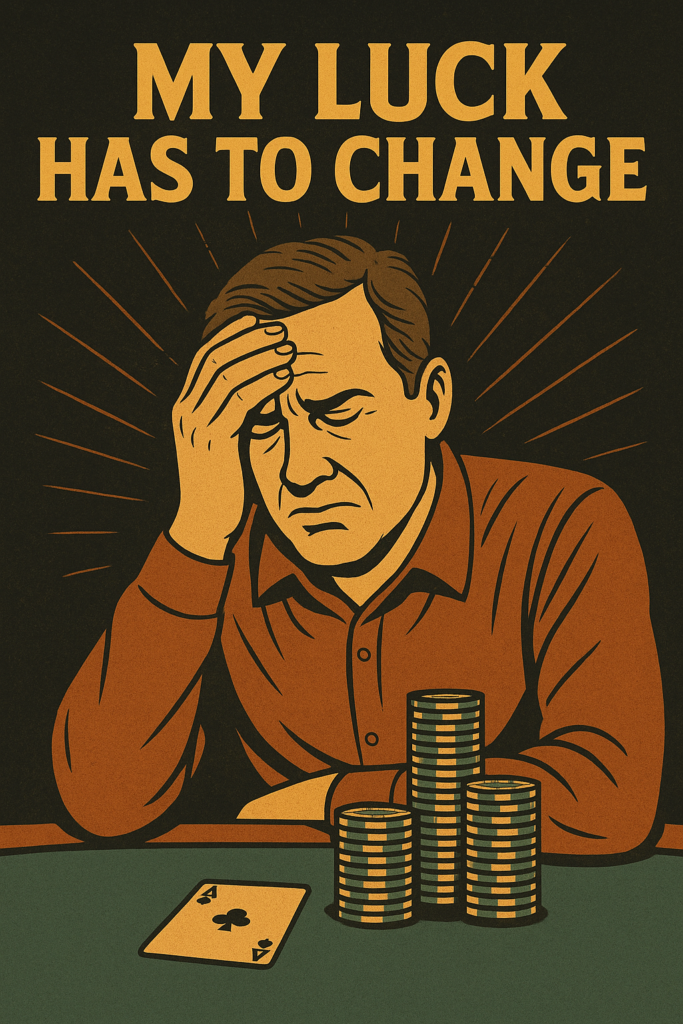
Every player has whispered it at least once: “My luck has to change.”
It’s a comforting lie — the kind that keeps you in the game long after reason says go home. The truth is, luck doesn’t have memory. Every deal is an independent event. The deck doesn’t care that you’ve been cold for two hours, and it doesn’t owe you a single card.
Believing otherwise is what psychologists call the gambler’s fallacy — the illusion that random outcomes must somehow “correct” themselves. But poker doesn’t work like a pendulum; it’s probability, not karma. The player who says, “I’m due,” is already making emotional decisions.
Once this thinking sets in, getting even in poker becomes less about skill and more about superstition. You stop analyzing ranges and start hoping for balance. You convince yourself that a heater is coming, that variance has to swing your way, and that the next hand will finally “make things right.”
But probability has no conscience. The cards don’t compensate, and the game doesn’t heal. You can only change one thing — your decisions. When you understand that, you stop waiting for variance to rescue you and start focusing on making the best choice available right now.
The irony is that true momentum in poker doesn’t come from luck at all. It comes from discipline — from folding when others chase, and from staying grounded while everyone else loses control.
🎯 “Your luck doesn’t change. Only your discipline does.”
SIDEBAR: REDEFINING LUCK IN POKER
Most players talk about luck as if it’s some mystical force — something that floats around the room, blessing one player and punishing another. But in truth, luck in poker isn’t random magic — it’s preparation meeting opportunity.
Luck is what happens when all your hard work — the hours of studying the math, analyzing hands, reading tells, and refining strategy — come together at the right moment. It’s not the cards; it’s your readiness when the cards arrive.
As the saying goes, “Luck is what happens when preparation meets opportunity.”
Was Michael Jordan “lucky” to become one of the greatest basketball players of all time? Hardly. His success was forged through endless hours of practice — skipping parties to work on his dribbling with one hand tied behind his back in the backyard of his home in Wilmington, North Carolina. That wasn’t luck. That was obsession.
Poker works the same way. The better prepared you are, the “luckier” you seem to get.
💭 In short: Luck isn’t found. It’s built — one disciplined decision at a time.
THE BANKROLL DISASTER - MOVING UP IN STAKES TO GET EVEN
Nothing drains a bankroll faster than emotion disguised as confidence. After a tough session, many players decide the best way to recover is to play higher — to win it back faster. It sounds logical in the moment, but it’s financial suicide. When you’re losing, you’re not thinking clearly. Your decision-making is compromised, and now you’re stepping into deeper water with a smaller life vest.
This is the point where getting even in poker turns into full-blown self-destruction. You convince yourself that moving up limits will “speed up” the recovery process. But if you can’t beat smaller games, you won’t suddenly beat bigger ones. The same leaks that cost you $100 at $1/$2 will cost you $1,000 at $5/$10 — just quicker.
Higher limits magnify every weakness — emotional, strategic, and financial. When you’re running bad and playing scared, bigger games don’t offer redemption; they offer exposure. Every mistake is more expensive, every decision more pressured.
💸 “If you can’t beat the game you’re in, you have no business buying a bigger loss.”
Good bankroll management isn’t just about protecting chips; it’s about protecting perspective.
When you feel the urge to move up after a losing session, that’s not your strategy talking — that’s your ego begging for revenge.
The pros know better. They step back, not up. They understand that recovery doesn’t happen by chasing; it happens by resetting.
WHEN LOSING - SLOW DOWN, DON'T SPEED UP
When you’re losing, your first instinct is to do something — anything — to change it. That’s the trap. The correct move isn’t to push harder; it’s to slow down. Losing is feedback, not punishment. It’s the game’s way of telling you that something needs to change — not your luck, but your approach. When the urge to start getting even in poker takes hold, that’s the moment when discipline matters most.
True professionals understand this instinctively. They don’t fight variance; they study it. They don’t chase; they recalibrate. When the cards go cold, they tighten up, refocus, and protect their stack until the storm passes. The amateurs press forward, mistaking motion for progress. The pros sit still until they can move with purpose.
DISCIPLINE IN POKER - WHEN LESS IS MORE
Doing less is often the smartest move you can make. Fold more. Observe more. Step back and look at the table dynamics. Losing sessions aren’t the time for hero calls or ego bluffs — they’re the time to protect your bankroll and your mindset.
In these situations, patience becomes your sharpest weapon. Most players grow restless and start forcing the action — firing at every pot, bluffing out of frustration, and calling with any two cards just to feel involved. That’s emotional noise disguised as strategy. The disciplined player does the opposite — tightens up, studies opponents, and waits for opportunities to present themselves. Selective aggression doesn’t mean playing scared; it means picking your spots with purpose. Sometimes that means folding for an hour before firing one decisive, profitable barrel.
This isn’t the time to straddle, chase coin-flip pots, or attempt high-risk, low-reward plays. It’s a time for thought, not impulse — for planning, not reacting. The player who learns to stay patient when everyone else unravels is the one who profits from the chaos.
The best players treat every loss as data. They review hands after the session, not during it. They know emotion and logic don’t coexist well at the table. As your heart rate rises, your clarity fades — and the next mistake is already waiting for you.
🧘 “When the game speeds up, slow yourself down.”
Sometimes the correct response is to walk away completely. Take a break, lower your limits, or end the session. Every great player knows that control isn’t proven by staying in the game — it’s proven by knowing when to leave it.
Because the real mark of mastery isn’t how you play when everything’s going right — it’s how you manage yourself when nothing is.
THE ZEN LESSON - DETACH FROM OUTCOME, FOCUS ON PROCESSES
Every poker player says they understand variance — but few truly accept it. Acceptance isn’t the same as awareness. You can know the math, you can quote the odds, you can even laugh off a bad beat — yet still let the results control you. Real understanding comes only when you stop measuring your success by outcomes and start measuring it by decisions.
The Zen approach to poker is simple: detach from the result, honor the process. The cards are random. Your reactions aren’t. When you define “winning” as making correct decisions over time, you free yourself from the emotional swings that destroy most players. The goal shifts from chasing profits to pursuing precision.
This isn’t detachment in the sense of apathy. It’s presence.
It’s learning to play inside the hand, not ahead of it or behind it.
You aren’t thinking about the chips you lost, or the ones you hope to win next — you’re thinking about the structure of this hand, this moment, this decision.
The classical poker player understands that getting even in poker has nothing to do with the past; it’s about staying balanced in the present. Every hand begins at zero. Each moment resets the equation. The player who can see the game this way isn’t affected by luck — because they’ve stopped believing in it.
☯️ “Detach from the outcome, and the outcome loses its power over you.”
Poker mirrors life: when you stop grasping for control, you begin to find it. Detachment doesn’t mean you don’t care; it means you care correctly — about the process, the patience, the structure, the discipline. Because when your focus is pure, the results eventually follow on their own.
.
BREAKING THE "GET EVEN" HABIT
When you hear that voice in your head — “I’ve got to get even” — that’s your warning light. It’s not telling you to leave. It’s telling you to check your mental state. Are you still focused, calm, and rational? Are you still analyzing each hand correctly, or have you started reacting instead of reasoning? That answer determines whether you stay or go — not your chip count.
The truth is, there’s no such thing as getting “even.” Every hand begins at zero. You can’t undo what’s already happened, and chasing it only pulls you further away from the present. What matters isn’t how much you’ve lost or won — it’s whether you’re still playing quality poker right now.
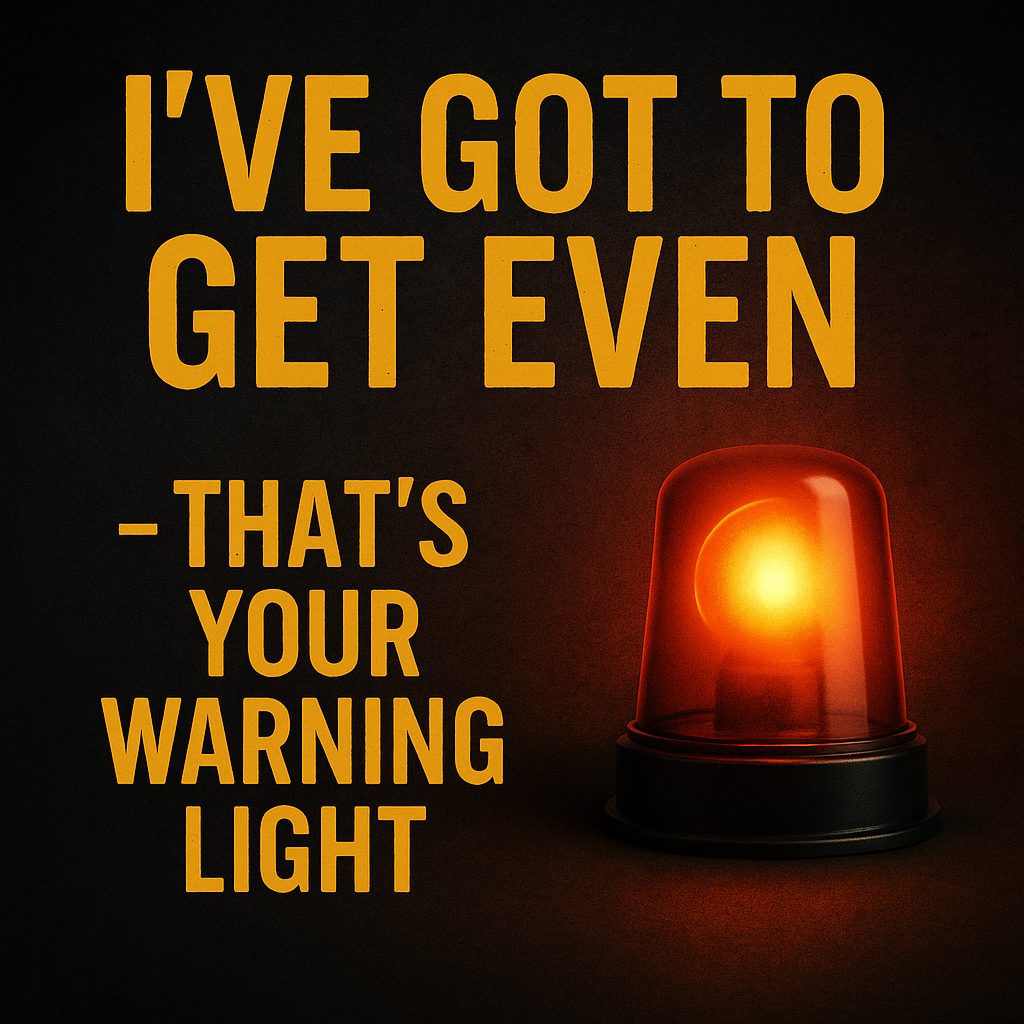
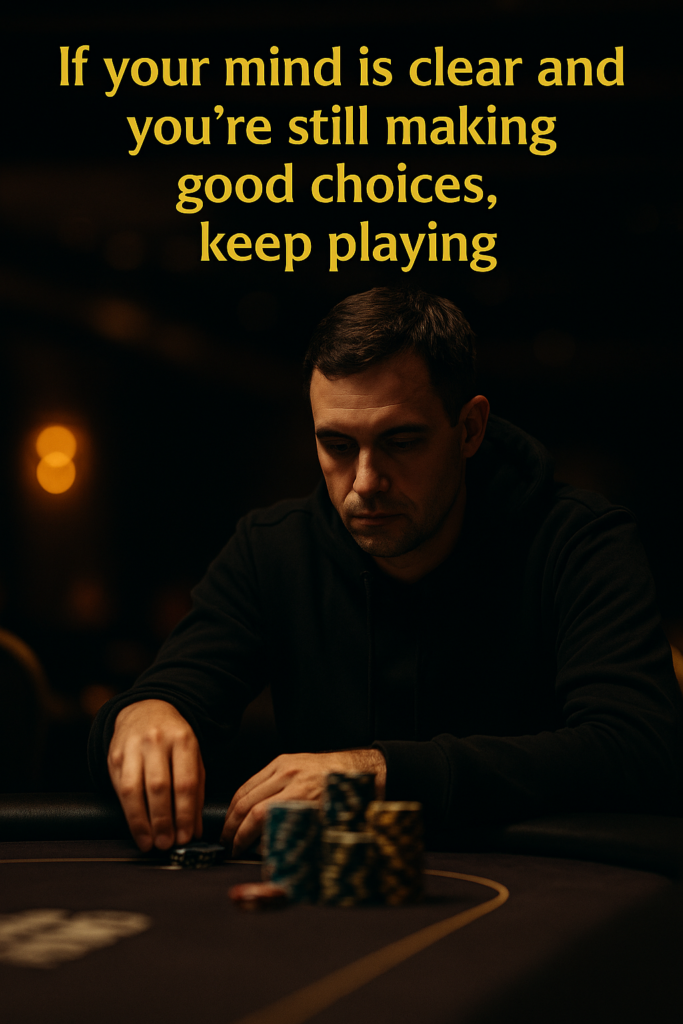
Forget arbitrary limits. You’re not a robot following a spreadsheet; you’re a strategist measuring the purity of your decisions.
If your mind is clear and you’re still making good choices, keep playing.
If your decisions start drifting, if impatience creeps in, or if the game feels unbeatable at the moment — stand up and walk away.
That’s the real discipline — the kind that separates professionals from emotional players.
Because when you focus on clarity, the quality of your decisions, and your mindset instead of the payoff, you stop “trying to get even” and start playing the kind of poker that wins over the long run.
FINAL REFLECTION: EMOTIONAL MASTERY IS THE REAL EDGE
Every losing player thinks their problem is the cards. Every winning player knows it’s the mind. “Getting even” isn’t just a poker mistake — it’s a human one. It’s the illusion that the past can be rewritten if we just push a little harder. But poker doesn’t reward emotion; it rewards awareness. The great players don’t chase hands or balances — they manage themselves. They stay grounded, patient, and focused on making the right decision, right now. Because in the end, poker is not about getting even with the table — it’s about getting even with yourself.
.


